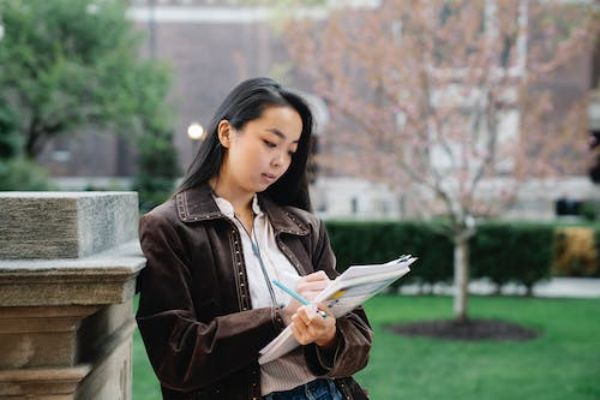学习七年级 英语单词 不仅是读书、听课、考试那么简单,而是要掌握好仁爱版亲爱机英语单词表,从而保证我们在七年级下册的英语考试中取得好成绩,下面是我为您整理的七年级下册英语单词表,希望对您有所帮助!
七年级下册英语单词表一

did (do的过去式)做,干
recite 背诵
poem 诗
magic 有魔力的
trick 把戏,诡计
enjoy 喜欢,欣赏,享受的乐趣
himself 他自己
enjoy oneself 过得愉快
certainly 当然,是的;一定;无疑
kung fu功夫
yesterday 昨天
ouch (突然受痛时的叫声)哎哟
fall 倒,落(下),降落;(美)秋季
wash 洗(涤),冲洗
at once 立刻,马上
washroom 盥洗室
happen 发生
stand 站;立;起立;坐落;经受;持久
stand up 站起,站立;起立
come back 回来;回想起来
lie 说谎,躺,平放,位于;谎言
video录像,视频
video game 电子游戏
truth真相,真理,事实
everyone每人,人人
had 有;吃;喝;进行;经受
tell a lie 撒谎
angry 愤怒的,生气的
each 每人,每个,每件
silent 无声的;无对话的
blow 吹,刮风,吹气,猛击,打击
blow out 被(风等)吹灭,熄灭
breath 气息,呼吸
sunny 晴朗的,阳光充足的
delicious 美味的,可口的
funny有趣的,滑稽可笑的
七年级下册英语单词表二
make 制造,做;使得
card 卡片;名片;纸牌
soon 很快,马上,不久
playground 操场,运动场
dance 跳舞
gym = gymnasium 体育馆,健身房, 体操
dormitory 学生宿舍
sleep 睡觉;睡
clean 弄干净,擦干净
lab 实验室
computer 电子计算机;电脑
room 房间,室,空间,地方
hall 大厅,会堂,礼堂;过道
dining hall 餐厅,食堂
classroom 教室
building 大楼,建筑物,房屋
swimming 游泳 ,游泳运动
pool 水池,水塘
run 跑,奔跑
borrow (向别人)借用,借
a few 一些,少量
project 专题研究;工程 ;项目
△workbook 练习册,作业本
course 过程,经过,课程
of course 当然
use 使用,利用,应用
better 更好地;更
look for 寻找
shelf 架子,搁板,搁层,礁,陆架
keep 保存,保持,继续不断
return 归还,回,归
on time 准时,按时
pleasure 高兴,愉快
post 邮件,邮政;邮寄,投寄
bye-bye 再见
talk 讲话,交谈;谈话,演讲
Lost and Found 失物招领处
purse 钱包
money 钱,货币
else 别的,其他的
picture 照片;;画片
put 放,摆
put on 穿,戴上;上演
around 在周围;在附近;大约
show sb. around 领(某人)参观
sit 坐
write 写,书写;写作,著述
△aha (表示了解或发现某事物的喜悦)啊哈
at the back of 在的后面
draw 绘画;绘制;拉,拖
because 因为
Japanese 日本人,日语;日本的,日本人的,日语的
wonderful 美妙的,精彩的,了不起的;太好了
also 也,而且,此外
七年级下册英语单词表三
gate 大门
the same to 对也一样
by 乘(车),靠近,在旁,在时间,不迟于,被,用,由
△subway 地下铁道,地铁交通
always 总是,一直,永远
come on 快点儿,加油,来吧
on foot 走路;步行
go to school 去上学
plane 飞机
train 火车;培训,训练
ship 船,轮船
boat 小船,小舟
Ms. 女士(用在婚姻状况不明的女子姓名前)
grandmother 奶奶;外婆
group 组,群
weekday 平日(星期一至星期五的任何一天)
△hmm 唔,哼
early 早地;早的
bird 鸟
catch 捉住,接住,赶上,染上(疾病)
worm 软体虫,蠕虫
seldom很少;不常
walk 步行,散步
never 决不,从来没有
sometimes 有时
ride 骑,乘车
park 公园;停放(汽车)
homework 家庭作业
do (one?s) homework 做家庭作业
watch 观看,注视;当心,注意
TV =television 电视;电视机
watch TV 看电视
life 生活,生命,人生

American 美国的,美国人的;美国人
or 还是,或;否则
few 很少的,不多的
have lunch 吃午饭
at school 在学校;在上课
day (一)天,(一)日;白天
rest 休息;剩余的部分,其余的人(物)
have a rest 休息
play 打(球);玩;游戏;播放
basketball 篮球
soccer 足球
swim 游;游泳
go swimming 去游泳
ball 球;舞会
game 比赛;运动;游戏
listen 听,仔细听
listen to 听
music 音乐,乐曲
read 读;朗读
library 图书馆,图书室
must 必须;应当;必定是
first 第一;首次;最初
once 一次;从前,一度
week 星期,周
twice 两次;两倍
every 每一,每个的
begin 开始;着手
have classes 上课
while 一会儿,一段时间;而,虽然,在的时候,和同时
bed 床
go to bed 睡觉
wall 墙
猜你喜欢:
1. 仁爱版七年级下册英语单词表
2. 仁爱版七年级英语下册单词表
3. 仁爱版英语七年级下册单词表
4. 仁爱英语七年级下册单词表
5. 仁爱版英语七年级下册单词表2017
七年级仁爱上册英语课件
Unit1 词组: 1、Goodmorning/afternoon/evening早上/下午/晚上好Goodnight晚安(晚上告别) 2、glad/nicetomeet/seeyou见到你很高兴(回答也一样) 3、welcometo+地点欢迎来到……(回答:Thankyou或者Thanks) 4、let’s+V原形让我们做…… 5、standup起立sitdown坐下 6、thisis-----这是……(用于介绍第三者的用语) 7、Howdoyoudo?你好(回答也是:Howdoyoudo?) 8、Howareyou?你好吗?Fine,thankyou.andyou?很好;谢谢;你呢? I’mOK/I’mfine,too.我也很好。 9、seeyou=seeyoulater=seeyousoon=good-bye再见 10、excuseme打扰一下;请问 11、I’m-----=mynameis----我是…… 12、befrom=comefrom来自 13、inEnglish用英语 14、Canyouspellit?Yes/No你能拼写它吗?能/不能 15、That’sOK/That’sallright/You’rewelcome/Notatall不用谢 16、……yearsold……岁 17、telephonenumber电话号码QQnumberQQ号码IDnumber身份证 18、thesame(相同的)反义词是different(不同的) 例:Weareinthesamegrade,butweareindifferentclasses. 句型: 1.Whatisyourname?你的名字是什么? 2.Where+be+主语+from?某人来自于哪里?(回答:主语+be+地点) Whereareyoufrom?Iamfromquanzhou. 3.Howold+be+主语?某人几岁?(回答:主语+be+数字) 例:Howoldareyou?I’mforteen. 4.Whatisyourtelephonenumber?你的电话号码是多少? (回答:Mytelephonenumberis----或者It’s-------)注意:读出号码的时候要逐个读出。 5.Whatclass/grade+be+主语+in?某人在哪一个班级/年级? 例:whatclassareyouin?IaminClassFive.(注意:Class和Five需要大写) whatgradeareyouin?IaminGradeSeven.(注意:Glass和Seven需要大写) 6.What’sthis/that(inEnglish)?这是什么?(回答:It’sa/an+单数名词.这是……) What’rethese/those(inEnglish)?这些是什么?(回答:They’re+复数名词这些是……) 7.Howdoyouspellit?你怎么拼写它?E-R-A-S-E-R,eraser.(注意拼读方法) Unit2 词组: 1、sb+has/have(an/a)+adj+五官===sb’s五官is/are+adj(描述长相) 例:Lilyhasasmallnose.=Lily’snoseissmall. 2、Iknow=Isee我明白了 3、That’sright那是对的 4、lookthesamelooklike看起来相像lookdifferent看起来不同 例:JimandLileilookthesame.==JimlookslikeLilei.. 5、lookat+n看某物lookfor+n寻找某人/某物lookafter+n照顾某人 6、both两者都……all三者或者三者以上都…… Both和all位于be动词或情态动词后,位于行为动词前。 例:Wearebothstudents.Webothhaveblackeyes.WecanbothspeakEnglish. 7、givesthtosb=givesbsth把某物给某人;(注意:如果sth是it或them,只能用前者) 8、havedifferentlooks==lookdifferent有着不同的长相(看起来不相像) havethesamelook.==lookthesame有着相同的长相(看起来很相像) 9、overthere在那边comein请进goout出去 10、in+颜色或ina/an/the+颜色+衣服表示穿着……颜色的衣服 常常接在名词的后面,表示穿----颜色衣服的……如thegirlinredismysister. 11、too+adj太…… 12、pants和shoes做主语,谓语动词用复数;但apairofpants/shoes作主语时,谓语动词用单数形式 例:Hisshoesareblack.Apairofshoesisunderthebed. 13、inthemorning/afternoom/evening在早上/下午/晚上atnight在晚上 14、goshopping=gototheshop去购物类似的有goswimminggofishinggoskating等等 15、helpsb.(to)dosth==helpsbwithsth帮助某人做某事注意:sb用代词时必须用宾格 16、highschool中学 17、play+球类playthe乐器 18、thinkof认为,想thinkabout考虑Ithink+从句我认为…… Ithinkheyouareright.否定式常否定主句,但翻译时要否定后面的从句 例:Idon’tthinkhecancome.我认为他不会来了.(不能说:我不认为他会来) 句型: 1、Whatdo/does+主语+looklike?询问人的长相 例:WhatdoesyourEnglishteacherlooklike? 2、What’s-----and------?……加……是什么?(回答:It’s------) 例:What’sredandyellow?It’sorange.What’stwoandfive?It’sseven. 3、Whose+东西+isthis/that?Whose+东西+arethese/those?这/这些是谁的……? 例:Whosecoatisthis?Itismine.Whoseshoesarethese?Theyarehers. 4、Whoistheletterfrom?这封信来自于谁?It’sfromLily.它来自于莉莉。 5、Whatcolorbe+东西?(回答:It’s+颜色或者They’er+颜色) 例:Whatcolorisyourdress?It’sblack. Unit3 词组: 1、Couldyou(please)……(后接动词原形)你愿意做某事吗? MayI……(后接动词原形)我能做某事吗? 2、theEnglishcorner英语角 3、livein+地点住在某地livewith+人和某人住在一起 4、Whatdoeshesayintheletter?他在信里说了些什么? Whatdoeshesayonthephoto?他在电话里说了些什么? 5、alot=verymuch放在句末,修饰动词,非常……例:Iliketheboyalot/verymuch. notatall一点也不……例:Idon’tliketheboyatall.. 6、eachother相互,彼此studentsoftentalktoeachotherinclass. 7、dosthwithsb和某人一起做某事 8、Noproblem没问题 9、speak+语言说某种语言speakEnglishspeakChinese 10、theGreatWall长城 11、come/goto+地点去某地但home、here、there这些是副词,前面不能加to 例:gohome/comehere/gothere gotodosth去做某事例:Theygotoplaybasketball. 12、likedoingsth喜欢做某事liketodosth想要做某事 13、It’s+adj+tosb对某人来说是……的 14、helpsbwithsth=helpsb(to)dosth帮助某人某事 15、beathome=bein在家gohome回家gethome到家inone’shome在某人的家里 16、haveaseat/takeaseat/sitdown请坐下 17、officeworker办公室职员cook厨师cooker炊具 18、onafarm在农场上onthesofa在沙发上 19、aphotoofone’sfamily某人的全家照FamilyTree家谱(首字母都大写) 20、inahospital在医院(纯属地点概念)inhospital因病住院 例:Heisillinhospital.他生病住院Heisinahospital.他在医院里(不一定是因为生病来到医院) 21、lookaftersb=takecareofsb照顾某人 22/teachsbsth=teachsthtosb教某人某东西teachsbtodosth教某人做某事 21、helponeself(tosth.)请随便(吃……)helpyourself/yourselves(tofish) 22、I’dlikesth=Iwouldlikesth.我想要…… 24、Wouldliketodosth=wanttodosth想要做某事 25、Wouldyoulikesomethingtoeat(drink)?你想要一些吃(喝)的东西吗? toeat或todrink修饰something,作为后置定语。 26、Hereyouare.给你Hereweare.我们到了 27、Whatabout……==Howabout…………怎么样? 后接代词或名词,还可以接动名词(即Whataboutdoingsth) 28、allright好的 29、acupoftea一杯茶twocupsoftea两杯茶 30、milkforme我要牛奶 31、Whynot……(后接动词原形)=Whydon’tyou……(后接动词原形)为什么不做某事呢? 回答:Goodidea好主意; 32、MayItakeyourorder?可以点菜了吗? 33、waitamoment=justamoment等一下,请稍侯waitforsb等待某人 34、CanIhelpyou?=MayIhelpyou?=WhatcanIdoforyou?需要点什么帮忙吗? 35、eatout出去吃饭 36、letsbdosth让某人做某事 37、havedinner/breakfast/lunch/supper吃正/早/午/晚餐 38、akindof一种……allkindsof各种各样的…… 39、befriendly/kindtosb对某人友好 40、suchas例如例:Ilikefruits,suchasoranges,bananasandapples 41、begladtodosth例:Iamgladtomeetyou,Iamgladtobehere.. 句型: 1、Whatdo/does+主语+do?==What+be+主语.?==What’sone’sjob? 回答:主语+be+职业. 例如:Whatdoesyourfatherdo?=Whatisyourfather?=What’syourfather’sjob? Heisateacher. Unit4 词组: 1、tryon试穿…… 2、we/Iwilltakeit我们/我买下了(这里的take相当于buy) 3、buysthforsb=buysbsth给某人买某物; 4、I’mjustlooking我只是看看; 5、threehundredandsixty-five365(百位数和十位数之间加and,十位数和个位数之间加”-“) 6、apairof一对/一双…… 7、runningshoes跑鞋 8、Areyoukidding?你开玩笑吧; 9、thinkabout考虑; 10、thankyouallthesame仍然谢谢你; 11、Isthatall?就这么多吗?That’sall.就这么多吧 I2、Ithinkso.我认为是这样的.Idon’tthinkso.我认为不是这样的. 13、当把东西给某人时可以说:Hereyouare或Herebe+东西或Hereitis. 14、Don’tworry.别担心①worryabout+宾语如:Doyouworryaboutyourleesson? ②Worried烦恼的beworriedabout+宾语如:Sheisworriedabouthermother. 15.afew+可数名词(肯定);一点,一些;few+可数名词:(否定)几乎没有 alittle+不可数名词(肯定);一点,一些;little++不可数名词:(否定)几乎没有 16、befree=havetime有空的;反义词:bebusy=havenotime Areyoufreetomorrow?==Doyouhavetimetomorrow? 17、在某一天使用介词on,在某个时刻用at如:onSundayatahalfpastsix 当this接时间,不用介词,thisSunday 18、What’sup=what’swrong?=What’sthematter什么事? 19、forgettodosth.忘记去做某事(事还没做)forgetdoingsth忘记曾做过某事(事已做完) 20、tellsbaboutsth.告诉某人某事tellsbsth=tellsthtosb把某事告诉某人 ask/tellsbtodosth叫某人做某事ask/tellsbnottodosth叫某人不要做某事 21、电话用语:①Who’sthis?你是哪位?②Isthis……你是……吗? ③Thisis……(speaking)我是……④MayIspeakto……我可以找……吗? 22、goforsth=gotodosth去做某事如:goforclass=gotohaveclass. 23、It’sfun真是有趣的事 24、callsb=givesbacall打电话给某人callsbback给某人回电话 25、I’mafraid/sorry(that)+从句恐怕……/对不起,…… 26、Ihavenotime=Idon’thaveanytime我没有时间(no=notany) 27、benotin=benotathome=beout出去了,不在家; 28、singasong/singsomesongs唱歌;flyakite放风筝;drawpicture画画 playsports做运动;watchTV看电视readbooks看书readnewspaper看报纸 29、letsbdosth(后接动词原形)让某人做某事 30、时间读法有顺读法和逆读法:顺读法(eleventhirty-six表示11:36) 逆读法(分钟数小于等于30分用past,分钟数大于30分用to,如fivepastten表示10:05; fivetoten表示9:55,halfpastsix表示6:30,aquertertosix表示5:45) 31、showsthtosb=showsbsth把……拿给某人看;作为名词表示演出,表演 32、祈使句的否定句,直接在句首加上Don't就可以了 33、haveto……(后接动词原形)不得不…… 48.It’stimeforsth/doingsthIt’stimetodosth该到做……的时候了? It’stimeforsbtodosth是某人做某事的时候了 33、nexttime下一次nextweek下个星期thenextday第二天; 34、nextto……=near……在……旁边 35、getup起床gotobed上床睡觉;getsbup叫某人起床 36、doone’shomework做作业; 37、haveapicnic野餐;haveclass上课haveameeting开会haveaparty举办聚会 havedinner/breakfast/lunch/supper吃正/早/午/晚餐have+东西吃/喝…… haveagoodtime=enjoyoneself玩得很愉快havesbtodosth让某人做某事 havetodosth不得不…… 38、ontheweekday在周末; 39、lotof=lotsof=many=much许多的,大量的 40、inthesun在阳光下; 41、sblike---best=sb’sfavorite+种类is/are……谁最喜欢…… 42、onone’swayto----在某人去……的路上;onone’swayhome在某人回家的路上 43、Hereweare.我们到了 44、It’sverykindofyou你真是太好了; 45、thanks/thankyoufor+n/v-ing为……而感谢你; 46、.inthetree在树上(外物附着)onthetree在树上(树上本身长出的东西) Inthewall在墙里(如window)onthewall在墙上 句型: 1、Whatdoyouthinkof----?=Howdoyoulike----?你认为……怎么样? 例:WhatdoyouthinkofyourEnglishteacher?==HowdoyoulikeyourEnglishteacher? 2、Howmuchbe+主语?(回答:It’s/They’re+价钱.) HowmuchisyourEnglishbook? 问价格还可以用what’sthepriceof…… 3、Whynot……(后接动词原形)=Whydon’tyou……(后接动词原形)为什么不做某事呢? 回答:Goodidea好主意; 4、Whattimeisit?==Whatisthetime?(回答:It’s+时间) (转载事先声明)
导语:学习并掌握用英语表达问候,自我介绍及认识他人的交际用语。以下是我为大家整理分享的七年级仁爱上册英语课件,欢迎阅读参考。
七年级仁爱上册英语课件Unit 1 Topic 1
一、知识目标
重要短语
Welcome to …欢迎到…来
Have a nice day! 祝您一天愉快
Excuse me! 对不起,打扰了!
See you later! = See you soon! 等会儿见!
See you tomorrow明天见!
Good—bye! == Bye—bye! = Bye! 再见!
Stand up、 起立
Sit down、 坐下
重点句型
1、Nice to meet / see you、 = Glad to meet / see you、 很高兴见到你。
2、What’s your name? 你叫什么名字?(常用于官方或者对小孩子说话)
My name is Maria、 = I am Maria、 我叫Maria。
3、 How do you do? How do you do? 你好! 你好!(初次见面时打招呼使用)
4、 How are you? 你身体好吗?
I’m fine / OK / well、 Thanks、 我很好,谢谢!(可以缩略为:Fine, thank you、)
Not bad, thanks、 不错,谢谢!
5、 This is Mary、 This is Tom、 这是Mary、 这是Tom、 (用于第三者介绍他人时)
重点语法
一般现在 时be用法:主语是第三人称单数,be用―is‖; 主语不是第三人称单数,be用―are‖ (I除外、用―am‖)、
二、要点讲评
1、Excuse me! 对不起,打扰了!(用在事情发生之前)
Sorry! 对不起(用在事情发生之后)
2、 Good morning 早晨好!
一般用于熟人、朋友或家人之间,比Hello和Hi要正式一些。Good morning、 后可以带称呼语(如某人、某先生、某女士等)。对方应答是Good morning或Morning。其中morning指早上或上午(中午12点之前)。如果了12点钟则用Good afternoon。大约在下午5点种之后,晚上9点种之前使用Good evening。约在9点种之后要说Good night。 例如:
A: Good morning, class!同学们,你们好!
B: Good morning, teacher!老师,早上好!
A: Morning, Mum! 早上好,妈妈!
B: Morning, Kate! 早上好,凯特!
3、 How do you do?
初次见面相互问候, 回答How do you do?、
4、Hello!
在口语中应用较广泛,多用于熟人、朋友、同学之间的相互问好,相当于汉语的 ―你好‖。这是一种非正式的、比较随便的问候语,使用时不受时间限制;此外打电话或
路遇熟人也可用。意为―喂;你好‖; Hello 在问候时表示―你好‖在打招呼或打电话时表示―喂‖。
例如 : A: Hello / Hi, Han Mei! 你好,韩梅。
B: Hello / Hi, Jim! 你好,吉姆。
5、 Hi
在现代英语中可以用来代替Hello。Hi比Hello 用的更多,显的更随和。
例如:①Hello/Hi, Kate、 你好,凯特。
②Hello/Hi, Jim、 你好,吉姆。
Hi 可用于表示问候、打招呼后引起对方注意,既可用于熟人、朋友之间,也可用 陌生人之间,既可单独使用,也可以加称呼语。
6、 How are you? 你好吗?
这是一个问候身体情况的句型,常用Fine, thank you、―很好,谢谢。‖来回答。如果第二人接着再问第一个人的身体状况,可以说Fine, thank you、 And you ? ―很好,谢谢。你怎么样?‖。第一个人可以回答―I’m fine, too、‖ Fine是I’m fine、的简答形式。
例如:—How are you, Mr、 Wang ? 你(的身体)好吗?,王先生?
—Fine, thank you、 And you ? 很好,谢谢。你也好吗?
—I’m fine, too、我也很好。
三、典型例解
( )1、 —Welcome to Beijing!
—____
A、 Welcome to Beijing, too、 B、 Thank you、 C、 Fine, thank you、
分析:B 对Welcome to、、、的回答常用Thank、、、结构。
( )2、 Mom, this is my teacher, Miss Lin、 Miss Lin, ____
A、 thank you、 B、 how are you? C、 this is my mom、
分析:C本题根据上下文语境考查―介绍……‖的常用语,一般为This is 、、、。
( )3、 —____
—Fine, thank you、
A、 How do you do? B、 How are you? C、 Are you Mr、 Wang?
分析:B How are you? 是英美等西方国家人们见面时的常用问候语, 它只是一句客套话,
意为―你好吗?‖, 并非真的要问别人的身体健康如何。常用于熟人之间, 应答语为Fine, thank you、 And you?
( )4、 —____ you Mingming?
—Yes, I ____、
A、 Are; are B、 Am; am C、 Are; am
分析:C 本题通过语境考查be动词的用法。在需要be动词的情况下, 第一人称单数(I)
和第二人称(you)分别用am, are。
仁爱版英语七年级学案
Unit 1 Topic 2
一、知识目标
重要短语
be from = come from 来自
in English 用英语
telephone number 电话号重点句型
Where are you from? = Where do you come from?
I’m from China、 = I come from China、
Are you from China? = Do you come from China?
Am I in New York? Yes, you are、 No, you aren’t、
Are you from the USA? Yes, I am、 No, I am not、 / Yes, we are、 No, we aren’t、
Is she Maria? Yes, she is、
Is he Tom? No, he isn’t、
Is it my book? Yes, it is、 No, it isn’t、
Are they from England? Yes, they are、 No, they aren’t、
Where are you from? I’m from China、 I’m Chinese、
Where is she / he from? She / He is from Japan、
Where are they from? They’re from France、
Where is Beijing? It’s in China、
Who is he / she? He is Michael、/ She is Jane、
Who are they / you? They are my teachers、 / We are Maria and Jane、 / I am Diana、
重要语法
1、 肯定句
⑴基本语序:主语——谓语(be+表语)…
⑵主谓一致:主语是第三人称单数,be用―is‖; 主语不是第三人称单数,be用―are‖
(I除外、用―am‖)、
2、 一般疑问句
一般来说,把肯定句中的―be‖提到句首,句末加―?‖。
例如: Is she Maria? Yes, she is、
Is he Tom? No, he isn’t、
⒊ 特殊问句
特殊问句=特殊疑问词+一般问句语序?
例如: Where is Beijing? It’s in China、
Who is he / she? He is Michael、/ She is Jane、
二、 要点讲评
1、 in English
是一个介词短语,意思是―用英语‖,其中介词in指―用某种语言‖。如:in Chinese 用汉语。―in +语言‖表示―用……语言‖的意思。
例如:Can you sing this song in English? 你能用英语唱这首歌吗?
2、 Spell it, please、
Spell it,please、是Can you…, please?句型的省略形式。当询问对方能否干什么或对方会不会干什么时,用这一句型。这是一个一般疑问句,用升调,表示请求。意思是―请你……可以吗?‖Can you spell…,please?请你把……拼读一下可以吗?若作肯定回答时则先用Yes, I can、若作否定回答,则通常用No, I can’t、或I’m sorry, I can’t、意思是―对不起,我不会。‖ 例如: —Can you spell your name, please?你能拼写你的名字吗?
—Yes, I can、 J—I—M, Jim、是的,我能。吉姆。
—Can you spell ―English‖, please?你能拼写出―English‖这个单词吗?
—No, I can’t、(I’m sorry, I can’t、)不,我不能。
3、 please
please一词可以用在祈使句中也可以用在疑问句中,它可以放在句首也可以放在句末,而用在疑问句中则只能放在句末,前面加逗号,please在特殊疑问句中的意思相当于中文的―请问……?‖这样显得更有礼貌,更为客气。在一般疑问句中,please实际上起一个语气词的作用,表示有礼貌,客气地提出请求或询问。
例如:What's this, please? 请问这是什么?
Can you spell your name, please? 你能拼写一下你的名字吗?
三、典型例解
( )1、 —Where ____ they from?
—They’re from China、
A、 is B、 am C、 are
分析:C 本题考查am, is, are与人称代词的搭配, 可由一句口诀―我是am, 你是are, is跟着他她它‖来记忆,they是―他们‖的意思,是第三人称复数后面接are,故选C。
( )2、 —____ your name?
—My name is Kate、
A、 What’s B、 What C、 Where
分析:A 由答语My name is Kate、可知是在问名字, 故可排除C, 同时该问句中应该有be动词, 故选A。
( )3、 —Is she Maria?
—No, she ____、
A、 is B、 isn’t C、 aren’t
分析:B 本题考查一般疑问句的否定回答, be动词+主语……?是一般疑问句的句式, 它的回答要用Yes后加肯定或No后加否定。因为有No,先排除A, 由she可知选B。
( )4、 —____, are you Mr、 Wang?
—Yes, I am、
A、 Fine B、 Please C、 Excuse me
分析:C Fine表示身体健康的;美好的;天气晴朗以及表示满意等;Please用于客气的请求或吩咐以及表示客气的接受和加强陈述的语气等;Excuse me意为―请问, 打扰了、对不起‖等, 常用于引起别人注意、问路、请求让路或打听消息等, 由语境可知选C。
( )5、 —Are they from Canada?
—No, they ____、
A、 are B、 aren’t C、 isn’t
分析:B本题考查一般疑问句的否定回答,由they可知选B。
( )6、 —What’s ____ telephone number?
—It’s 8265—3412、
A、 you B、 your C、 my
分析:B you表示―你,你们‖作主语;your 表示―你的/你们的‖作形容词性物主代词,此句是问你的电话号码是多少, 故选B。
( )7、 —____ are they?
—They are XiaoLi and Jane、
A、 Who B、 What C、 Where
分析:A 本题考查疑问代词的用法。what 表示―什么,怎么样‖; where 表示―在哪里,往哪里‖;而who 表示―谁‖。由答语他们是Maria和Jane可知选A。
( )8、 Mary ____ from Cuba、
A、 is B、 am C、 are
分析:、 A 本题考查am, is, are的用法。Mary为第三人称单数, 故选A。
( )9、 ―One one zero‖ 表示 ____。
A、 火警 B、 匪警 C、 急救中心
分析:B 火警119, 匪警110, 急救中心120。one one zero翻译成110, 故选B。
( )10、 —Is he Li Ping?
—Yes, ____、
A、 I’m B、 he’s C、 he is
分析:C 一般疑问句的简单肯定回答中没有缩略式, 故选C。
Unit 1 Topic3
一、知识目标
重要短语
How old
What class
in Class Four
English name
in the same school
look atin Grade Eight
重点句型
1、 What’s your My phone number is …
2、 How old are you?
I’m …
3、 What’s your
My English name is Tom、

4、 Who’s ? That’s Nancy、
5、 W hI’m in Class Four。
6、What grade is she in? She is in Grade Eight。
7、 What’s this ’s
免责声明:本平台仅供信息发布交流之途,请谨慎判断信息真伪。如遇虚假诈骗信息,请立即举报
举报